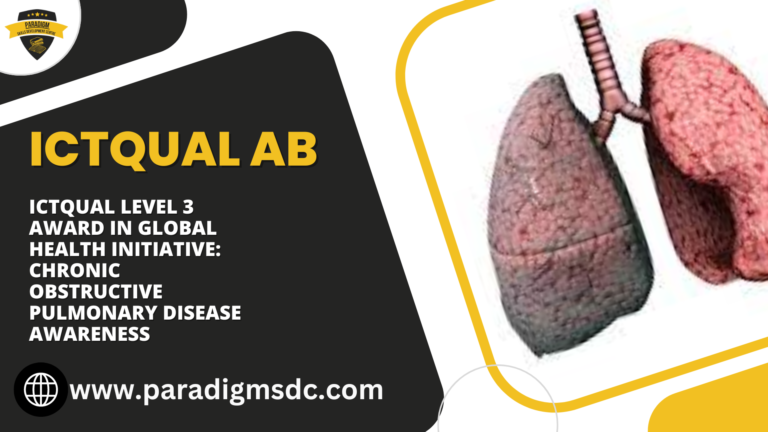Course Introduction
The ICTQual Level 3 Award in Social Care Essentials is a comprehensive training program designed to equip individuals with the foundational skills and knowledge necessary for a successful career in social care. This course covers the essential aspects of social care work, including communication, person-centered care, safeguarding, and professional conduct. Whether you are new to the field or looking to formalize and enhance your skills, this course provides a solid foundation for working in various social care settings.
Course Overview
The ICTQual Level 3 Award in Social Care Essentials offers a blend of theoretical learning and practical application to ensure that participants are well-prepared for the challenges and responsibilities of social care work. The course is structured to cover a wide range of topics relevant to social care, providing a holistic understanding of the field and preparing participants to deliver high-quality care and support.
Course Study Units
- Introduction to Social Care
- Health and Wellbeing
- Communication Skills in Social Care
- Legal and Ethical Considerations
- Technology in Social Care
- Professional Development
Learning Outcomes
By the end of this course, participants will be able to:
Introduction to Social Care
- Understand the role and importance of social care in supporting individuals’ well-being and independence.
- Define ethical responsibilities and principles of person-centered care.
- Recognize key stakeholders involved in social care, including clients, families, caregivers, and healthcare professionals.
Health and Wellbeing
- Promote physical and mental health strategies among individuals receiving social care.
- Evaluate the impact of social determinants on health outcomes and overall well-being.
- Develop care plans integrating holistic approaches to enhance individuals’ well-being.
Communication Skills in Social Care
- Demonstrate effective verbal and non-verbal communication techniques in social care contexts.
- Practice active listening and empathetic responses to facilitate meaningful interactions with clients and colleagues.
- Adapt communication styles to meet the diverse needs of individuals receiving social care.
Legal and Ethical Considerations
- Explain the legal responsibilities and obligations of social care professionals within local and national regulations.
- Interpret policies related to safeguarding, confidentiality, and informed consent in social care practice.
- Analyze ethical dilemmas in social care settings and propose ethical solutions.
Technology in Social Care
Introduction to Social Care
- Understand the role and importance of social care in supporting individuals’ well-being and independence.
- Define ethical responsibilities and principles of person-centered care.
- Recognize key stakeholders involved in social care, including clients, families, caregivers, and healthcare professionals.
Health and Wellbeing
- Promote physical and mental health strategies among individuals receiving social care.
- Evaluate the impact of social determinants on health outcomes and overall well-being.
- Develop care plans integrating holistic approaches to enhance individuals’ well-being.
Communication Skills in Social Care
- Demonstrate effective verbal and non-verbal communication techniques in social care contexts.
- Practice active listening and empathetic responses to facilitate meaningful interactions with clients and colleagues.
- Adapt communication styles to meet the diverse needs of individuals receiving social care.
Legal and Ethical Considerations
- Explain the legal responsibilities and obligations of social care professionals within local and national regulations.
- Interpret policies related to safeguarding, confidentiality, and informed consent in social care practice.
- Analyze ethical dilemmas in social care settings and propose ethical solutions.
Technology in Social Care
- Evaluate the role of technology in enhancing communication, care coordination, and efficiency in social care services.
- Demonstrate proficiency in using digital platforms for documentation, monitoring, and data management.
- Implement protocols to safeguard sensitive information and ensure compliance with data protection regulations.
Course Benefits
- Comprehensive Knowledge: Gain a thorough understanding of essential social care concepts and practices.
- Practical Skills: Develop practical skills that can be directly applied in social care settings.
- Career Readiness: Enhance employability and preparedness for a variety of roles within the social care sector.
- Professional Development: Build a strong foundation for further training and specialization in social care.
Who is this Course For?
This course is ideal for:
- Individuals seeking to start a career in social care.
- Current social care workers looking to formalize and enhance their skills.
- Volunteers and support staff in social care settings.
- Students pursuing careers in social work, healthcare, or community services.
Future Progression
Upon completing the ICTQual Level 3 Award in Social Care Essentials, participants can further their career development by:
- Pursuing advanced qualifications such as the Level 4 Certificate in Social Care Practice or the Level 5 Diploma in Leadership for Health and Social Care.
- Gaining experience and seeking roles with greater responsibility, such as team leader or care coordinator.
- Continuing education in related fields, including social work, nursing, or community health.
- Exploring opportunities for specialization in areas such as dementia care, mental health support, or disability services.
The ICTQual Level 3 Award in Social Care Essentials is a valuable qualification for anyone looking to excel in the social care field. By mastering the skills and knowledge covered in this course, participants can provide high-quality care, support the well-being of clients, and advance their careers in the social care sector.







